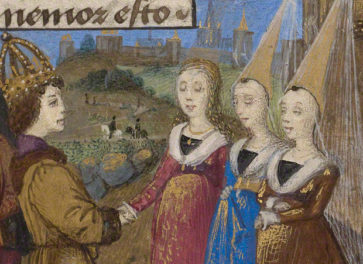
Woman in Blue Reading a Letter, Johannes Vermeer, about 1663–64. Oil on canvas, 18 5/16 x 15 3/8 in. (49.6 x 40.3 cm). Rijksmuseum, Amsterdam. On loan from the City of Amsterdam (A. van der Hoop Bequest)
Vermeer’s Woman in Blue inspires love wherever she goes. When we invited you to imagine the first line of that mysterious letter she’s holding, you responded with nearly 200 creative ideas (and counting) via The Iris, Facebook, and Twitter—from the heartfelt to the hilarious (and a few that are both).
Vermeer’s lady is receiving gushy missives from husbands and illicit lovers; business offers; ransom notes; even a letter from Rembrandt. Some letters reflect extensive historical research, others delightfully out-there imaginations. There are clever plot twists, clever wordplays; even clever ideas (an invoice for the painting!) without a specific opening line. We’ve even received a few notes in Dutch, and some complete story lines (note to Hollywood: sequel to Girl with a Pearl Earring?). We love them all so much, we put on our amateur acting caps and read several of the most stirring opening lines for this communal video valentine.
But I did say I’d pick just one of these opening lines by this week and use it to write the rest of your letter. The task was tough, but I kept coming back to a prophetic one-liner shared by Beth, which reads simply, “Let me tell you of the future.” Here is my attempt at the rest—I have no doubt that you can do better (much better!), and I invite you to do so in the comments.
Dear woman in blue,
Let me tell you of the future.
You will be forgotten. Your name, your age, your family, your home, the child you carry—of them, future generations will know nothing. And it is normal that it be so. For we are ordinary people, not popes and queens for the history books. Of our quietly lived but deeply felt lives, the details slowly fade.
Your image, however, will be immortal. Through it, you will travel far—not by horse and cart, or merchant ship, but through the sky. You will leave your country and go to lands of which you can hardly dream: Shanghai, the Portuguese colonies (they will call it “Brazil”), that poorly mapped western island of America the Spanish have named California. Illustrious individuals, including Dutch compatriot Vincent van Gogh more than two centuries hence, will draw inspiration from you. There will be wars, and republics, and kings and queens. But in the end, though you will leave your home of Delft, you will not go far—just north to the big city, Amsterdam, whose museum will offer you pride of place forever.
Of you we will remember only one fleeting moment, the cool morning when you unfolded this letter and, filled with emotions we will never tire of guessing, gasped. And for this we are grateful. For this ordinary moment speaks to all of us who seek the extraordinary: to love and be loved.
With deep affection,
Anne

 Your image, however, will be immortal. Through it, you will travel far—not by horse and cart, or merchant ship, but through the sky. You will leave your country and go to lands of which you can hardly dream: Shanghai, the Portuguese colonies (they will call it “Brazil”), that poorly mapped western island of America the Spanish have named California. Illustrious individuals, including Dutch compatriot Vincent van Gogh more than two centuries hence, will draw inspiration from you. There will be wars, and republics, and kings and queens. But in the end, though you will leave your home of Delft, you will not go far—just north to the big city, Amsterdam, whose museum will offer you pride of place forever.
Your image, however, will be immortal. Through it, you will travel far—not by horse and cart, or merchant ship, but through the sky. You will leave your country and go to lands of which you can hardly dream: Shanghai, the Portuguese colonies (they will call it “Brazil”), that poorly mapped western island of America the Spanish have named California. Illustrious individuals, including Dutch compatriot Vincent van Gogh more than two centuries hence, will draw inspiration from you. There will be wars, and republics, and kings and queens. But in the end, though you will leave your home of Delft, you will not go far—just north to the big city, Amsterdam, whose museum will offer you pride of place forever.


Dear woman in blue,
Two apart, one in heart.
Fair lady;
For you to initiate a correspondence at this time compels me to reply.
Your delicate fingers must now be so near the ink pulled by these tender fibers from this pen.
Dear Woman in Blue. I have left you for a Lady in Red.
“Before assembling your IKEA camera obscura, please carefully read the following set of instructions…”
Dearest Daughter,
Now that you have married the man I had chosen for you and carry his child, I write to inform you the first and last of the fate of your illegitimate 5 year old son Heinric, is that I have sent him to the New World, New Haarlem, to be indentured as servant to the potter Van Kleek until he reaches the age of 25 years or death, whichever comes to him first.
You are in the far-off empty other side. Will my thought arrive on your mind?
Dear Anne,
I do not have any suggestions for the rest of the letter. I just wanted to say that your text made my cry (while sitting at work). It is beatiful and very poetic.
Thanks.
bye woman in blue,
“why does your love, hurt so much… don’t know why,
why does your love, hurt so much… tell me why”
http://youtu.be/OyXLUvB-QHA